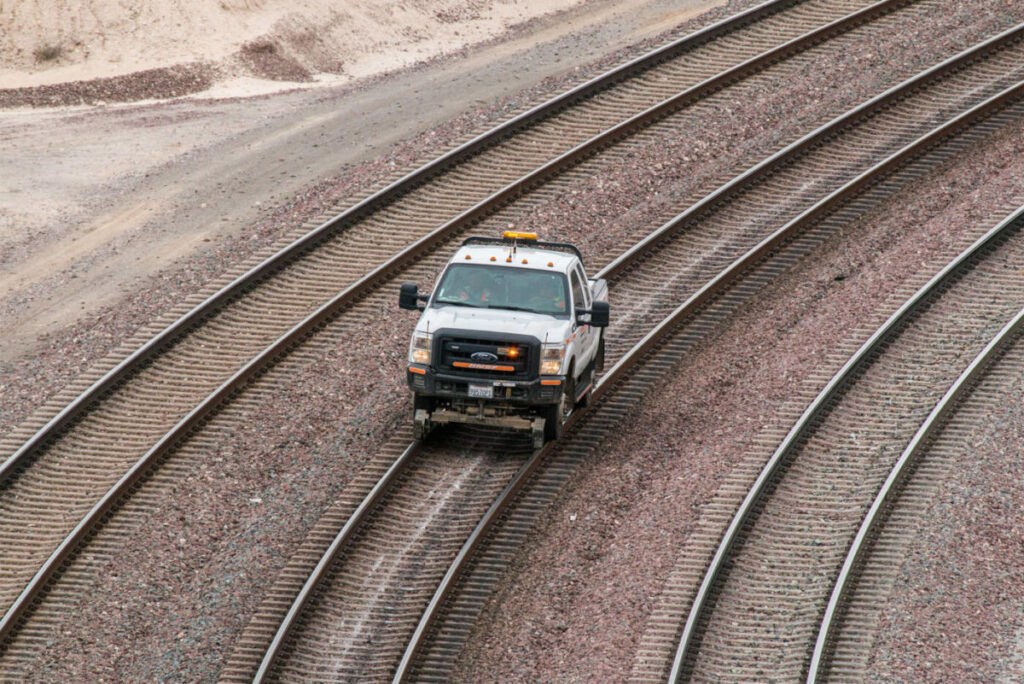This story originally appeared on Trains.com.
WASHINGTON – BNSF Railway, CSX, and Union Pacific filed lawsuits against the Federal Railroad Administration today for its failure to act on a half dozen safety waiver requests that in some cases would allow railroads to scale back visual inspections in areas where they have deployed new high-tech train and track inspection systems.
The litigation asks federal courts to find FRA’s inaction on waiver requests is “arbitrary and capricious” and in violation of FRA’s own regulations requiring action within nine months, the Association of American Railroads said.
“Rail safety is a shared responsibility, and the FRA’s unlawful delays are creating uncertainty and preventing critical advancements in safety and efficiency,” AAR CEO Ian Jefferies said in a statement. “By law, the FRA is required within specified timelines to act and either grant or deny these petitions, yet it has repeatedly failed to meet its legal obligation, forcing the industry to file suit. Enhancing the safety and efficiency of the rail network cannot wait, and the industry has now had to file lawsuits to try to break FRA’s systemic inaction.”
The AAR says that the next level of safety improvements will hinge on new approaches to track and train inspections.
“Continually advancing new approaches is critical and under the present regulatory framework often requires a waiver from rules that were put in place decades ago and did not necessarily contemplate modern advances in technology,” the AAR said.
Railroads are free to deploy autonomous track inspection systems, as well as wayside detectors and other equipment that can spot defects in moving equipment, such as brake system problems or cracked wheels. However, they cannot simultaneously scale back visual inspections due to regulations that specify how often the traditional inspections must be performed.
Trains News Wire reported on Monday that the safety agency bows to organized labor concerns and misses its own deadlines when reviewing railroad requests to expand track and train inspection programs that also reduce visual inspections.
And, in a departure from longstanding FRA practice, a political appointee is now involved in waiver decision-making. Previously the Railroad Safety Board waiver reviews were handled by the FRA’s career safety professionals, who acted independently and made decisions solely on the basis of safety.
Now, in some instances the recommendations of staff safety experts are ignored due to political considerations, according to people familiar with the matter. If rail labor opposes a waiver, the petition is rejected or ignored, they say.
The FRA’s proposed rulemaking on safety waivers, introduced last week, seems to confirm this approach. In order to pass FRA muster, a waiver request must be deemed in the public interest and consistent with rail safety. The proposed rule aims to define those terms for the first time. “To show that a proposal is ‘in the public interest,’ FRA proposes that a petitioner could provide evidence that the regulatory relief requested would not eliminate jobs or eliminate required visual inspections, but would add additional positions, or improve the existing positions,” the rulemaking says.
AAR says Congress has required FRA to modernize its regulations by periodically reviewing longstanding waivers to determine if revising the existing regulations based upon the results of those programs would be appropriate.
Some of the waylaid waivers have been awaiting an FRA decision for more than two years. In some cases, the requests are for extensions of waivers that would renew existing programs that have been shown to improve safety.
“Importantly, these technologies are not intended to simply be stacked on top of the underlying outdated regulatory framework,” the AAR says. “Rather, there are tremendous opportunities to employ science and data to modernize, harmonize and improve current regulated approaches to railroad safety.”
The FRA has disagreed, noting in some cases that railroads need to take a “belt and suspenders” approach that uses new technology while maintaining required inspections using railroad employees.
BNSF filed suit over three delayed waiver requests; Union Pacific two; and CSX one. Although Norfolk Southern has several waiver requests caught in FRA limbo, the railroad did not file a suit against the safety watchdog.
The AAR is a party to the lawsuits, which use common language regarding the FRA’s inaction.
“FRA (1) is denying waivers even when the undisputed evidence shows the waiver will enable the railroad to conduct safer operations; (2) is refusing to rule on new waiver requests; (3) is refusing to renew existing waivers that have been on the books for years; and, on information and belief, (4) has invited rail labor officials to review all existing waivers outside of the normal notice-and-comment process and identify waivers they would like to see revoked or non-renewed when they expire,” according to the legal filings. “In implementing its new policy, FRA has been disregarding or directing the decisions of the agency’s own Safety Review Board, including by (for the first time) placing political appointees on the Board.”
The lawsuits ask federal courts to treat FRA’s delayed action on the waiver and reconsideration requests as effective denials and either set them aside or direct FRA to grant them.
As an alternative, the railroads have asked federal courts to order the FRA to rule on the waiver requests within 30 days.
An FRA spokesman declined to comment on pending legal matters.
The post Railroads ask federal courts to order FRA to take action on waylaid safety waivers appeared first on FreightWaves.
Read the full article here


